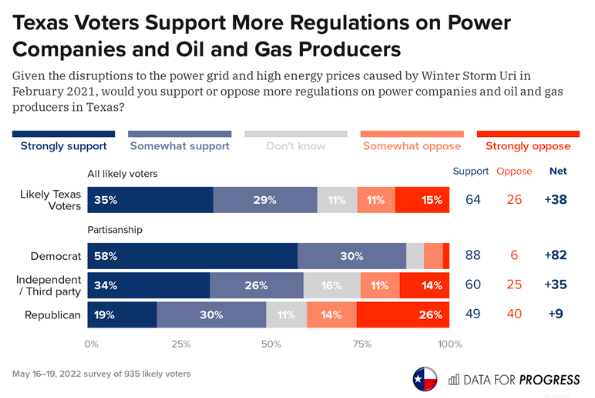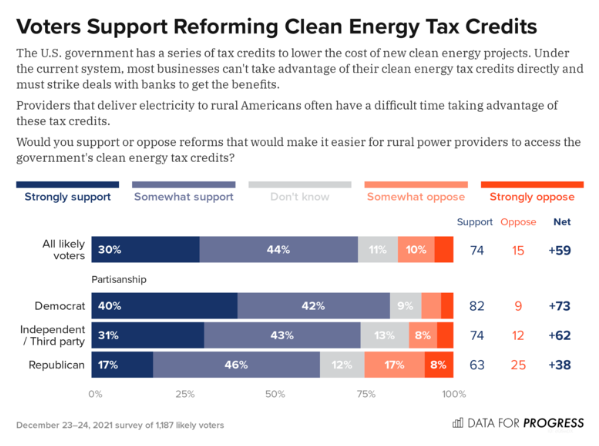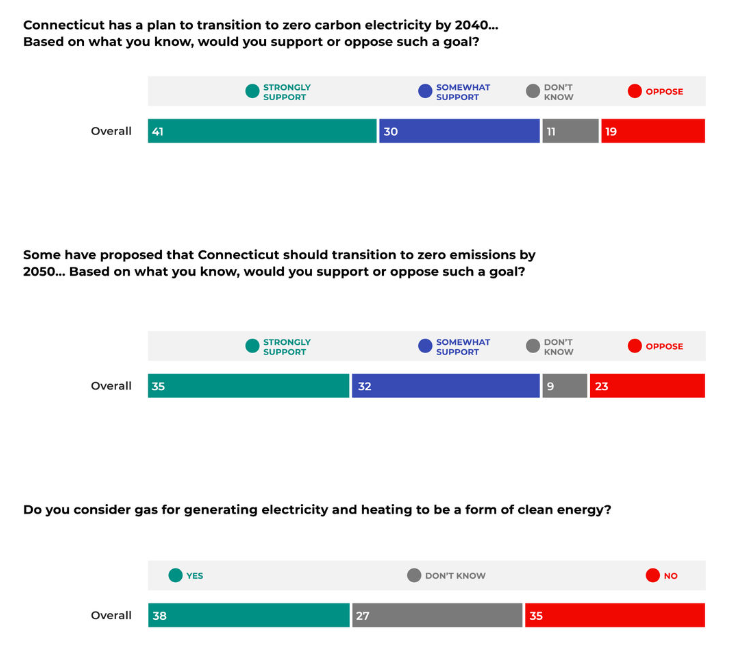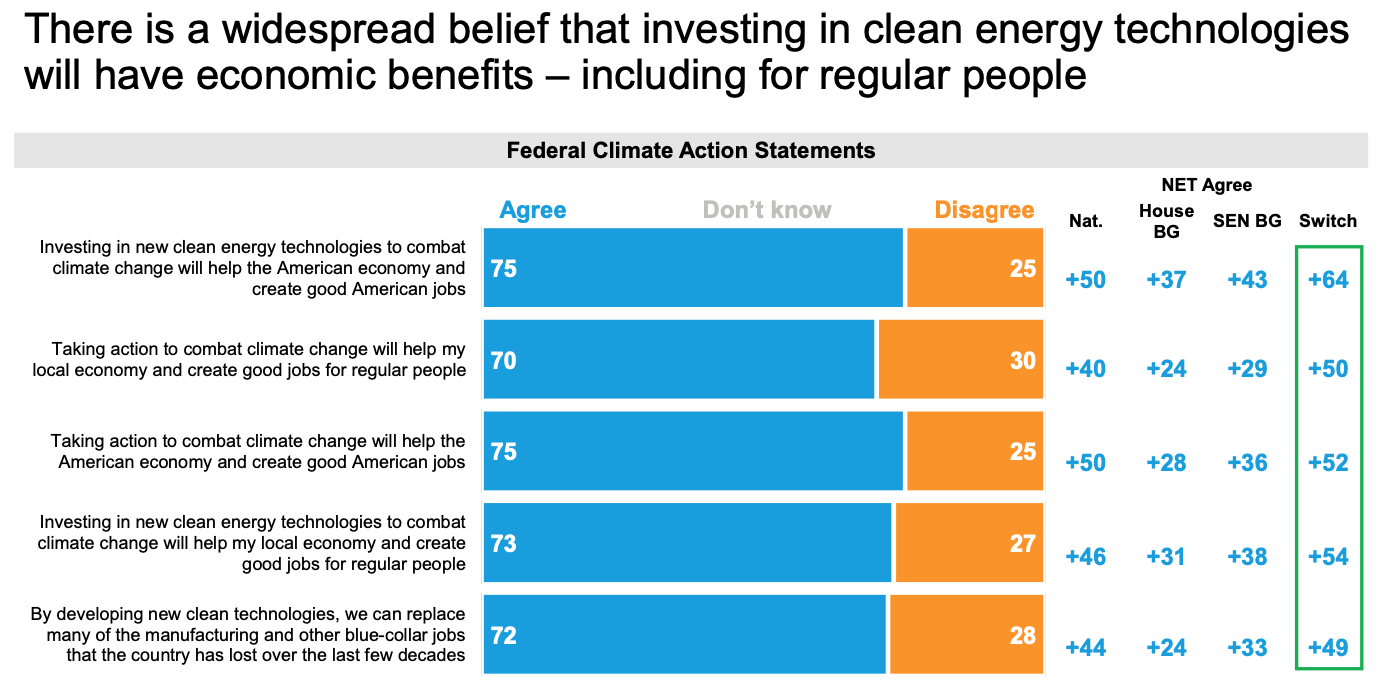Resources
Search below for resources covering the intersection of climate engagement, social science and data analytics.
RESULTS
Texas voters view the clean energy transition as a net positive for the state economy, and most want to see their state leadership strengthen regulations on utilities and fossil fuel companies. 65% of Texans agree that state leaders such as Governor Greg Abbott and Attorney General Ken Paxton didn’t do enough to protect consumers with high energy bills following Winter Storm Uri, and two-thirds (67%) believe that the federal government should investigate possible price gouging by power companies during the storm. Additionally, only 35% believe that the Texas state government is doing enough to prepare the state for the impacts of climate change. The clear majority (64%) support more regulations on power companies and oil and gas producers “given the disruptions to the power grid and high energy prices caused by Winter Storm Uri in February 2021.” And by a 56%-34% margin, Texans side more with an argument that “regulations on energy companies need to be stronger in Texas to ensure power stays on and to protect Texas consumers from high prices” than a competing argument that “regulations on energy companies are an overstep of the government, don’t usually deliver the benefits they promise, and are not worth the cost.” Importantly, the poll also finds that more Texans believe that the clean energy transition will improve Texas’s economy (47%) than worsen it (35%).
Poll: Strong local and statewide support for Diablo Canyon Nuclear Power Plant
California voters lean toward keeping nuclear energy in the state’s power mix, while their support for natural gas has declined. The poll encouragingly finds that voters overwhelmingly approve of solar (91% approve, including 73% who say they “definitely” approve of it) and wind (81% approve, including 67% who “definitely” approve of it) being used as electricity sources for the state. A clear majority also approve of natural gas as an electricity source (71% approve), though with considerably less enthusiasm (40% “definitely” approve) than they feel about solar and wind. Californians are relatively more split in their feelings about nuclear power, but over half approve of it being included in the state’s energy mix (54% approve / 36% disapprove). The poll release also includes time-series trend data from 2013 for comparison. This trend data shows that, over the past nine years, Californians’ approval of nuclear (51% to 54%, +3) and solar (94% to 91%, -3) has barely budged, while there’s been a dip in approval of wind power (92% to 84%, -8) and a more sizable drop in approval of natural gas (89% to 71%, -18).
Poll: Massachusetts Voters Want More Clean Energy
A survey of 600 registered voters in Massachusetts showed voters remain concerned about climate change and optimistic about renewable energy.
Bipartisan majorities of Indiana voters support net metering and expanding renewable energy use in the state. 75% of Indiana voters support net metering, including 74% of Republicans and 72% of Trump voters. 74% of Indiana voters support expanding the use of renewable energy in Indiana, including 63% of Republicans.
Poll: It's Time for Congress to Reform Clean Energy Tax Credits
Voters support reforming the clean energy tax credit system with “direct pay” to clean energy producers. 74% of voters, including majorities from both parties, support a “direct pay” proposal that would make it easier for clean energy providers to access the government’s clean energy tax incentives.
Poll Deck: The Changing Public Opinion on Climate Change
This deck from polling firm Global Strategy Group compiles recent public opinion findings on climate and clean energy issues, including the top-testing messaging and language to proactively talk about climate and health, economic impacts, and environmental justice as well as guidance on how to respond to attacks.
(This deck was collected by the Environmental Polling Consortium. If you would like to learn more about the EPC and receive weekly polling insights, please contact epc@partnershipproject.org)
Poll: Connecticut Voters are Ready for Bold Action on Climate and Clean Energy
A poll of 600 registered voters across Connecticut revealed a number of helpful data points about current voter attitudes towards clean energy and fossil fuels including:
Environmental Polling Roundup - August 6th, 2021
This post includes a roundup of climate + environment headlines from this week’s public polls, good data points to highlight, and a full roundup including key takeaways from each poll.
HEADLINES
- Climate Power + LCV - Investments in clean energy, climate action, and environmental justice bolster support for the reconciliation bill; the most persuasive messages focus on economic aspects including how the bill will lower costs for households (Slide Deck)
- Climate Power + Data for Progress - Voters support a range of climate-related proposals that were left out of the bipartisan infrastructure bill, especially clean electricity incentives, investments in energy efficiency, and investments in solar and wind (Release, Memo, Topline)
- POLITICO + Morning Consult - Voters continue to back the bipartisan infrastructure bill, especially investments in roads, bridges, and water infrastructure; voters are more split on the reconciliation package, but overwhelmingly support expanded home care for the elderly and disabled (Topline, Crosstabs)
- Data for Progress - Voters think that oil and gas companies have too much power, especially after learning about comments made by a senior Exxon lobbyist; “oil and gas companies” are a more compelling villain than “fossil fuel companies” (Release, Topline)
- Yale Program on Climate Change Communication + George Mason University Center for Climate Change Communication - Petition signing is the most appealing ask to get voters involved in climate advocacy, and there is clear interest in community preparedness groups (Summary, Full Report)
Poll: Voters Strongly Back Climate-related Infrastructure Investments
Survey data from 19 competitive House districts across the US revealed strong support (59%), across party lines, for the American Jobs Plan. Notably, the provisions that would address the climate crisis garnered even stronger support than the overall infrastructure plan did.
Among the specific provisions designed to address the climate crisis:
- 82% of voters support investments to rebuild roads and bridges and modernize public transportation to ensure it is cleaner and able to serve more people.
- 81% of voters support overhauling our country’s drinking water infrastructure.
- 70% of voters support addressing the challenge of climate change by shifting to greater use of clean energy, reducing carbon pollution from vehicles and industry, and making homes and buildings more energy efficient.
- 69% of voters support investments in clean energy such as wind and solar power by extending tax credits to spur innovation and manufacturing.
- 61% of voters support investments in electric vehicles and charging stations to reduce pollution and help more Americans buy clean cars.
Poll: Investing in American Clean Energy to Build the Industries of the Future
Key findings of a survey (phone and online) of US voters, with oversamples in key states include:
- Voters across the political spectrum overwhelmingly support government investments in clean energy technologies in order to rebuild the economy (77%), create good jobs (76%), and eliminate the carbon emissions that cause climate change (75%).
- There's a widespread belief (75%) that investing in clean energy technologies will have economic benefits – including for "regular people."
- And also that by developing new clean technologies, we can replace many of the manufacturing and other blue-collar jobs that the country has lost over the last few decades (72%)
- Strong support for various approaches to boost and develop specific clean energy technologies such as clean steel and cement, clean jet fuels, and energy storage and transmission.
- Voters support investing $75 billion in clean energy tech RD&D as part of the upcoming infrastructure bill.
Pagination
- Previous page
- Page 2
- Next page





